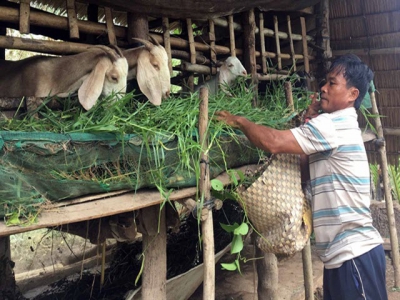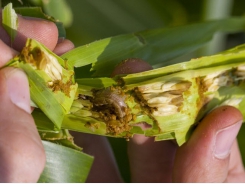Trà Vinh farmers breed more goats that meet bio-safety standards

TRÀ VINH — The Cửu Long (Mekong) Delta province of Trà Vinh has encouraged farmers to breed more goats that meet biosafety standards and use bio-products to treat goat waste.
Thạch Phong, one of the farmers participating in the model, said that his 2,000 sq.m of land affected by saltwater intrusion in the dry season was not effective for growing crops, so the AMD Trà Vinh programme gave him VNĐ29 million (US$8,600) to breed goats.
In 2016, the province’s Department of Agriculture and Rural Development and the Project for Adaptation to Climate Change in the Mekong Delta in Trà Vinh Province (AMD Trà Vinh) launched the goat breeding model in Duyên Hải District’s Long Vĩnh Commune. It was begun as a response to climate change and the lack of land for large farming plots.
Thạch Phong, one of the farmers participating in the model, said that his 2,000 sq.m of land affected by saltwater intrusion in the dry season was not effective for growing crops, so the AMD Trà Vinh programme gave him VNĐ29 million (US$8,600) to breed goats.
With the funds and his own money of VNĐ9 million ($390), he bought five female goats and one male goat. After one year, they produced 10 baby goats. They weighed up to 20 kilogrammes each after six to seven months and sold for VNĐ2 – 3 million ($86 - 130).
With the income from breeding goats, his family was able to escape poverty in 2017. In the past two years, he has earned about VNĐ60 million ($2,590) from breeding goats. He now has 22 goats.
Nguyễn Văn Phùng, deputy director of the province’s Agriculture Extension Centre, said the coastal commune of Long Vĩnh had been affected by climate change. Besides breeding aquatic species, farmers in the commune had been breeding goats in recent years, he said.
However, this had been done on a small scale with traditional farming methods, resulting in low efficiency and disease outbreaks.
The AMD Trà Vinh model was launched to ensure the sustainable production of goats in the commune.
Under the model, farmers have learned how to choose female and male goats best suited for reproductive purposes and how to make sheds for them.
They also have learned about the best kinds of food for goats, how to grow different types of grass for feed, how to make silage from green forages and how to prevent and control common diseases.
Participating farmers receive 30 per cent of the cost of input materials like supplementary food and mineralised salt licks, medicine and bio-products for treating goat waste.
The survival rate of goats bred under the model is 98 per cent, and the bad odours caused by goat waste have been reduced by 90- 95 per cent compared to traditional breeding methods.
Up to 25 farmers in and outside the commune have participated in the model.
To have outlets for goat farmers, the province has encouraged companies to invest in zoned areas for goat breeding in Châu Thành, Trà Cú, Cầu Ngang and Duyên Hải districts and Duyên Hải Town.
Each zoned area can breed 500 goats and costs about VNĐ30 billion ($1.29 million).=
The province has offered preferential policies such as land rental, labour recruitment and business establishment procedures for investors in the zoned areas.
Có thể bạn quan tâm
Phần mềm

Phối trộn thức ăn chăn nuôi

Pha dung dịch thủy canh

Định mức cho tôm ăn

Phối trộn phân bón NPK

Xác định tỷ lệ tôm sống

Chuyển đổi đơn vị phân bón

Xác định công suất sục khí

Chuyển đổi đơn vị tôm

Tính diện tích nhà kính

Tính thể tích ao hồ



 Nearly 2,000 poor farmers capitalized in first nine…
Nearly 2,000 poor farmers capitalized in first nine…  The Ministry of Industry and Trade proposes solutions…
The Ministry of Industry and Trade proposes solutions…